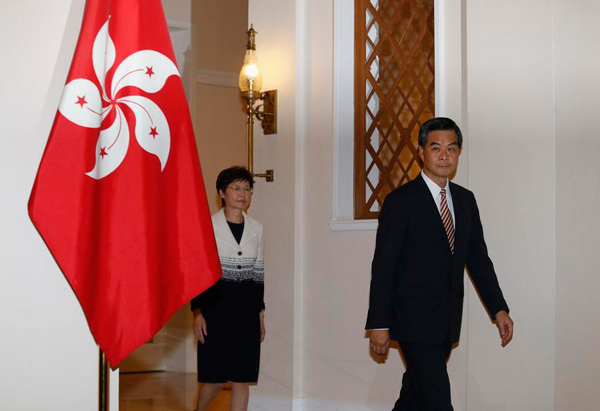 |
|
Hong Kong Chief Executive Leung Chun-ying (R) and Chief Secretary Carrie Lam walk past a Hong Kong flag as they attend a news conference in Hong Kong, late October 2, 2014. [Photo/Agencies] |
Chief executive refuses to quit; newspaper warns demonstrators 'doomed to failure'
Crowds of protesters on the streets of Hong Kong dwindled sharply on Friday after the special administrative region's chief executive agreed to arrange a meeting with their leaders over demands for electoral reforms.
Following a fifth night of rallies, crowds thinned out, leaving about 100 outside the government complex.
Demonstrators had set a deadline of midnight on Thursday for Chief Executive Leung Chun-ying to resign and for Beijing to abandon proposals on selection of candidates who want to stand for chief executive in 2017 elections.
Leung refused to quit, but in a televised appearance shortly before the deadline he appointed his deputy to meet with a prominent students' group that has been at the center of the protests.
The government compound, the focal point of the protests, remained closed because the demonstrators had blocked entrances, preventing civil servants from going to work.
In some areas, the demonstrators faced hostility from crowds who complained that the protests were blocking access to businesses. A few men tussled with protesters as they tried to dismantle barricades.
"Give us Mong Kok back. We Hongkongers need to eat," one man shouted as he tried to remove barricades in the district.
Scuffles also broke out between about 25 protesters and 50 opponents in Causeway Bay, with one anti-protester yelling, "This is not democracy, we need to feed our kids." Onlookers cheered as barricades were removed.
Leung again urged the protesters on Friday to clear the streets. "I call upon every leader of the movement to bear their rightful responsibilities and to persuade protesters to halt their actions," he said.
Some in the city of 7 million said the protests are undermining their livelihoods.
Ken Lai, who runs a perfume business in Causeway Bay, said: "They have affected delivery of goods in the area. I really dislike the fact that they occupied so many areas around the city. I'm a Hongkonger, too. The protesters don't represent all of us."
The protesters had threatened to surround or occupy government buildings if Leung did not step down by the Thursday deadline.
He asked Chief Secretary Carrie Lam to arrange talks with the protesters. Lam said she will seek a meeting with leaders of the demonstrations as soon as possible.
"I hope both sides will be satisfied," she said. "Students had wanted a public meeting, but I hope that we can have some flexibility to discuss details."
The Hong Kong Federation of Students said in a statement early on Friday that it plans to join the talks with the government, focusing specifically on political reforms.
In a commentary on Friday, The People's Daily said the small group of protesters were attempting to "hijack" the system and force changes to the electoral rules to benefit a minority of people.
"The core of their efforts to gain so-called universal suffrage is to ensure that their representatives, including those who confront the central government, can become candidates for chief executive," the commentary said, adding that this effort is doomed to failure.
There is "no room for concessions" on the candidate-selection issue. Hong Kong "is directly under the jurisdiction of the central government; it is not a country or an independent political entity", it said.
Hong Kong Financial Secretary John Tsang warned on Friday afternoon that sustained protests in the city's financial district could cause permanent damage to the financial hub. He said the stock market could expect to experience short-term volatility and that investors should be aware of the risks. "Hong Kong is at a critical juncture," he said. "This is not the time to lay blame. ... this is the time that we have to come together to solve problems."
He spoke as calls grew on Friday for Hong Kong's investment climate to be protected.
Wang Jun, of the China Center for International Economic Exchanges, said falls on the stock market had reflected investors' worries about the situation.
He said that as well as the fine tradition of rule of law, Hong Kong attracts investment through a sound and fair market order.
"Investor confidence will be affected if the illegal gatherings continue," he said, adding that the city's international credit ratings could also suffer.
It is estimated that the "Occupy Central" protests could cost Hong Kong HK$40 billion ($5.15 billion).
Thirty-six branches of 19 banks in Hong Kong have been closed since the protest started on Sept 28.
There were 30,000 fewer mainland visitors to Hong Kong on Wednesday, the first day of the National Day holiday, than last year.
Over the seven days of the holiday, about 20 to 30 percent fewer mainland tourists are expected than last year, as the protest affects retail sales.
The holiday week is usually a peak tourist season in Hong Kong, but this year visitor numbers have plummeted, said Wei Xiao'an of the World Tourism Cities Federation.
"Transportation, hotels, restaurants and shops have all been hit. Personal safety is not guaranteed. Who wants to go there?"
Wei hopes stability will be restored in Hong Kong as soon as possible and that its image as an international tourism destination will not be ruined.
The Federation of Hong Kong Hotel Owners said more than 200 hotels in the city will probably lose nearly HK$100 million a day.
Liu Xuezhi, a financial researcher at the Bank of Communications, said: "If 'Occupy Central' continues, Hong Kong will miss great development opportunities and the bill will ultimately be paid by the public."
Xinhua and agencies contributed to this story.
